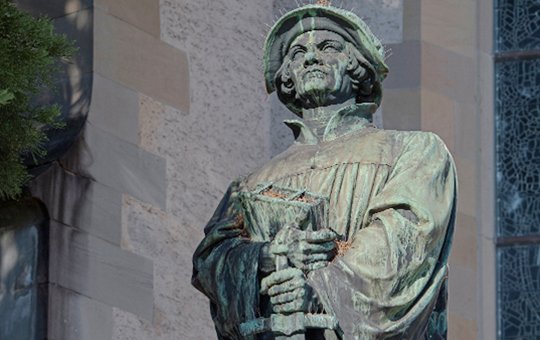In view of the Swiss reformer Huldrych Zwingli’s appointment as pastor at the Zurich Great Minster in January 1519, the NCCJ has declared 2019 the year of Zwingli. Since the reformer is less known in Japan, Zwingli’s theology and particularly its influence on the social-diaconal and political witness of the churches will be the focus of the trip. “We are pleased to welcome sister churches from Japan and Germany to Switzerland. Together we would like to reflect anew on the legacy of the Zurich reformer and explore its potential for the future,” said FSPC President Gottfried Locher about the purpose of the visit.
After a seminar from 29 April to 1 May at the Rügel Conference Center near Seengen, with lectures on the Reformation and social ethics from Zwingli to Karl Barth, the guests from Japan and Germany will visit various sites associated with the Reformation. This will include historical places and themes in Zurich (2 May), the Karl Barth Archive and Mission 21 in Basel (3 May), as well as current social projects in parishes, e.g. those dealing with refugees and migration. In Bern (4 May), meetings with a National Council member and the Federation of Swiss Protestant Churches are planned.
The visit will conclude on Sunday, 5 May at 4 pm, with a communion service according to the Aargau yodel liturgy. The service will be celebrated in German and English in the town church of Aarau, presided by the Aargau Church’s Council President pastor Christoph Weber-Berg. For him this is a special return visit: “Since I represented the Swiss churches at a conference on the anniversary of the Reformation in Tokyo three years ago, the Japanese churches have been close to my heart. It makes me very happy to welcome them here.”
Media representatives are invited to interview interesting representatives of the foreign delegations and speakers.
The National Christian Council in Japan NCCJ is the association of the Protestant churches and organizations in Japan, comprised of some 30 members (United, Lutherans, Baptists, Koreans, Anglicans, the YMCA, etc.). The approximately 800,000 Christians in Japan make up less than one percent of the country’s population. However, despite their small numbers, their influence on developments in various areas of society such as education, social work, human rights, women’s affairs and the peace movement is remarkable.
